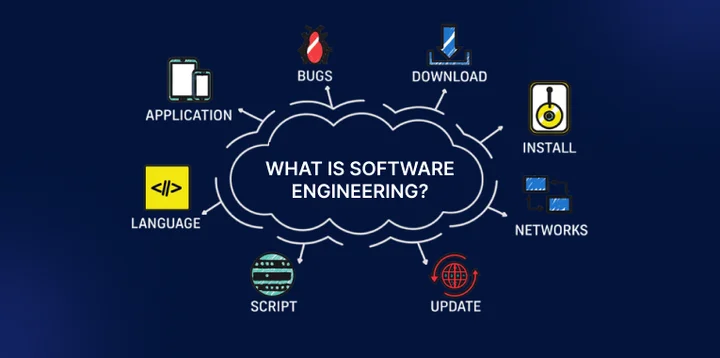People often mix up the terms developers and engineers as synonyms. But in reality, they are not the same.
Recently, a friend of mine told me that his company hired developers to design its whole system. But, guess what? It got wasted, not because the developers were bad, but because that’s an engineer’s job.
If you’re just starting out, check out our guide on how to become a software developer to understand the basics before diving into roles.
Therefore, knowing the real difference between Software development vs software engineering is important:
Developers build features, whereas engineers design the bigger picture so things don’t break when you scale.
As per the recent report, 90% of startup companies fail because of poor technical team structuring and execution.
So, let’s get started with the blog to know the real difference that will save your time and money.
What is Software Development?

Software development is the process of turning ideas and plans into working software. However, it is not possible with a software developer.
What do they actually do?
Software developers are the people who write the code and make the planned idea into working software. Without a developer, the software development process will just be an idea. A software developer’s daily role includes fixing bugs, coding, testing, and improving the software.
👉Learn more in our blog in detail about what is software development to get a deeper understanding.
What is Software Engineering?

Software engineers are the people who plan and design complex systems to handle a very large number of users. They plan for how the system will work, so that no problem arises when millions of users use it at once.
What do they actually do?
Software Engineers actually solve problems like scaling servers, managing distributed systems, and ensuring security.
Their goal is not just to make software work, but to make it reliable, efficient, and secure. This helps the system run smoothly without causing unexpected failures.
10 Key Differences between a Software Developer vs Software Engineering
| Aspect | Software Developer | Software Engineer | Why It Matters |
|---|---|---|---|
| Problem Solving | Creative, Iterative, Experimental | Methodical, Systematic, Analytical | Need both for speed and reliability |
| Educational Background | Self-taught, Bootcamp, CS degree | Typically, a formal CS/Engineering degree | Theory becomes practical at scale |
| Thinking Scope | “How do I build this feature?” | “How does this affect the entire system?” | Engineers prevent cascade failures |
| System Design | Implements existing designs | Creates architectural blueprints | Bad architecture compounds exponentially |
| Collaboration | Primarily team-focused | Cross-functional leadership | Engineers bridge technical and business |
| Knowledge Depth | Deep expertise in a specific stack | Broad understanding across technologies | Engineers make platform decisions |
| Stakeholder Interaction | Internal Team Members | Everyone, from the CEO to the customers | Engineers translate business to tech |
| Career Trajectory | Senior Dev → Tech Lead → Manager | Staff → Principal → Architect/CTO | Different paths need different support |
| Salary Range | $92K-$120K Average | $105K-$150K Average | Budget accordingly for expertise |
| Risk Approach | Implements security features | Design security into architecture | One breach can kill a SaaS company |
Breaking It Down Further:
1. Problem-solving approaches:
Software Developers solve their problems by quickly trying different solutions and fixing things as they go. They experiment and improve code fast to make features work.
Whereas Software Engineers analyze problems more deeply. By applying structured thinking and engineering principles to find the best solutions.
Real-World Importance: Both approaches are important in the real world. Developers help deliver features quickly so your product grows fast.
Engineers ensure those features work well together at scale and won’t break under pressure. Together, they build faster but safer software that can grow with your business.
2. Thinking scope:
Developers focus on building specific parts or features of a software product, like creating a login page or a new button. They solve immediate tasks that users see and interact with.
Beginners can start with the best programming languages for beginners to pick the right languages to learn first.
Engineers, however, think bigger. They consider how these features work together within the entire system. They plan for future challenges, like handling lots of users at once or protecting the system from security threats.
Real-World Importance: Engineers prevent problems that only show up when the system grows large. Without their oversight, small issues can turn into major failures later.
3. Educational Background:
Software developers are usually self-taught or through a degree. If you want a clear roadmap, check our guide on a software developer career to see what steps to take.
They learn through boot camps, internships, vocational training, and a computer science degree. Their learning focuses on mastering programming languages, tools to create functional applications, and frameworks.
Whereas, a software engineer learn from their 4 years of a computer science or software engineering degree. Their learning focuses on advanced concepts like algorithms, architecture, and system design.
Real-World Importance: That theoretical knowledge helps solve complex issues, especially when facing scaling problems or system crashes.
4. System design:
Developers design their system by writing the actual code by following the plans and designs they receive. Their goal is to build specific features that are asked for via blueprint.
Whereas software engineers design the overall blueprint of the software system. They decide how all parts fit and work together. Their goal is to plan for security, scalability, and performance from the start.
Real-World Importance: Good architecture decisions add long-term value; bad ones can double your fixing time and costs.
5. Collaboration:
The developers tend to collaborate with their programming team and work together on writing and testing code.
Engineers work with other teams, such as DevOps, security, product managers, and finance, to make sure that there is no hindrance. They allow interconnection between various sections of the business, and the software works well.
Real-World Importance: Engineers contribute to the prevention of the last-minute surprises that may interfere with production and impose expensive downtime.
6. Knowledge depth:
Developers specialize deeply in specific languages and frameworks. Such as JavaScript/React, Python/Django.
Engineers have broad knowledge across many technologies, including cloud services, Docker, Kubernetes, databases, and networking.
Real-World Importance: Engineers guide technology choices that impact your product’s future scalability and maintainability.
7. Stakeholder interaction:
Software developers interact with their immediate team and product managers for any technical solution, and not with stakeholders directly.
Whereas, Software engineers regularly communicate with stakeholders, clients, and non-technical teams to translate business needs into technical solutions.
Real-World Importance: Engineers serve as bridges between business goals and technical realities, preventing miscommunications.
8. Career trajectory:
Developers often grow into senior developer or tech lead roles, sometimes moving into engineering roles.
Engineers progress to architect, principal engineer, or CTO positions.
Real-World Importance: Clear career paths improve employee retention and team stability.
9. Salary range:
Salary is a big deal in our decision when it comes to choosing a career. Let’s see that difference as per the latest US data:
Software developers: Junior makes $70,000 to $85,000, Mid-level makes $92,000 to $120,000, and in a senior-level position makes $120,000 to $145,000
Software engineers: Junior makes $95,000 to $115,000, Mid-level makes $105,000 to $150,000, Senior-level position makes $140,000 to $200,000.
Note: In tech hubs like San Francisco or New York, salaries can be 30-50% higher.
Real-World Importance: An Engineer getting underpaid means that the company might only hire juniors or lose talent. Therefore, it is essential to budget wisely.
10. Risk approach:
Developers implement security as described in their tasks. Engineers design security into every layer of the system proactively, anticipating potential threats.
Real-World Importance: In SaaS, one security breach can cost millions and ruin reputations. Engineers protect your company’s future and peace of mind.
Software Development VS Software Engineering: Responsibilities and Skills
Responsibilities
- Developers write code to make specific parts of software.
- Engineers design the whole system and plan how it all works.
Skills
- Developers know coding languages and tools well.
- Engineers know how to design systems, solve big problems, and make software work smoothly at scale.
Both have their individual important role in the tech market that work and last. To boost your credibility and skills, consider pursuing software development certifications.
Building a Team That Won’t Fall Apart at Scale
Match Your Team to Your Stage
From studying many SaaS companies, this is what works best:
Just Starting Out (MVP Stage)
- 70% Developers / 30% Engineers
- You need features fast, but hire at least one senior engineer early to avoid future problems.
Starting to Scale (Growing User Base)
- 60% Developers / 40% Engineers
- Balance is key, build features and keep your system stable. Hire platform engineers if you haven’t yet.
Big League (Enterprise Customers)
- 50/50 split or more engineers
- Need strong engineering leadership and experts to handle complex systems.
Team Structure That Works
- Feature Teams: 3-4 developers per engineer (engineer’s guide to keep work realistic)
- Platform Teams: Mostly engineers (build the important backend and infrastructure)
- Security Teams: Mix of both (design and implementation work together)
- DevOps Teams: Led by engineers, developers involved too (avoid deployment issues)
Closure
Lastly, we can say that software development and software engineering are not the same thing, but are deeply connected. Both have their individual important role in the tech market that work and last.
But when you put them together, you get the products that are not only built to last but also launched fast.
So the real difference is? About knowing when you need a developer and when you need an engineer to build successful software.
